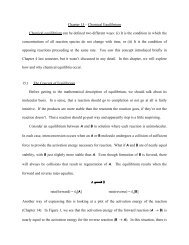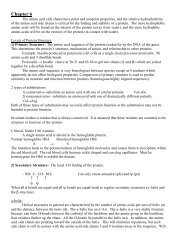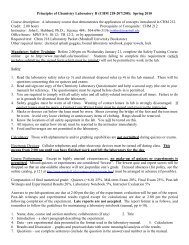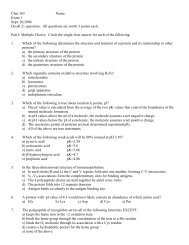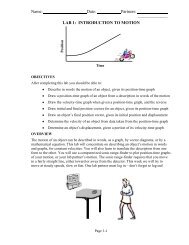THE DHAMMAPADA: THE WAY OF THE BUDDHA, VOL. 9-12 The ...
THE DHAMMAPADA: THE WAY OF THE BUDDHA, VOL. 9-12 The ...
THE DHAMMAPADA: THE WAY OF THE BUDDHA, VOL. 9-12 The ...
You also want an ePaper? Increase the reach of your titles
YUMPU automatically turns print PDFs into web optimized ePapers that Google loves.
74 <strong>THE</strong> <strong>DHAMMAPADA</strong>: <strong>THE</strong> <strong>WAY</strong> <strong>OF</strong> <strong>THE</strong> <strong>BUDDHA</strong>, <strong>VOL</strong>. 9-<strong>12</strong><br />
For millions of years, monkeys have been seeing man standing on two feet and they have not learned the trick<br />
yet. You don’t see suddenly a monkey walking like a man. How did it happen in the first place that a few monkeys<br />
started walking on two feet and became the ancestors of humanity? It does not seem to be likely.<br />
But all the awakened ones of the world have known that as far as the mind of man is concerned, it is very<br />
like the monkeys; it is not much different. <strong>The</strong> real monkey is not in your body but in your psychology; it is not<br />
physiological, it is psychological.<br />
Your mind is continuously jumping from one tree to another tree. It is constantly restless; it cannot remain<br />
restful even for a single moment. It wants to be continuously occupied. And what is the gain?<br />
Buddha says: LIKE A MONKEY IN <strong>THE</strong> FOREST YOU JUMP FROM TREE TO TREE, NEVER FINDING<br />
<strong>THE</strong> FRUIT FROM LIFE TO LIFE, NEVER FINDING PEACE.<br />
Peace is the fruit and the mind has no idea what peace is. It knows only conflict, it knows only war, violence,<br />
destruction. It knows only all sorts of perversions, neurosis, psychosis. It knows a deep inner split, but it knows<br />
nothing of peace; it has never tasted it, it is absolutely unknown. It is only a word, empty of any meaning.<br />
Meaning comes through experience, otherwise all words are empty. God is an empty word to you because you<br />
have not experienced it. Peace is an empty word to you because you have not experienced it.<br />
Buddha does not use the word ’bliss’. That was always the case before Buddha: that bliss is the fruit. Satchit-anand<br />
truth, consciousness, bliss these are the three aspects of the ultimate fulfillment. But Buddha does<br />
not talk about bliss for a certain reason. <strong>The</strong> reason is that the moment you talk about bliss you are bound to<br />
be misunderstood. People start thinking about happiness and pleasures maybe on a higher plane, but their idea<br />
of pleasure remains the same, their idea of happiness remains the same. <strong>The</strong>y think of sexual pleasure even in<br />
paradise.<br />
<strong>The</strong>re are religions who even allow homosexuality in paradise, because they were born in countries where<br />
homosexuality was very much prevalent. And every religion promises you beautiful women in paradise. Who has<br />
projected these ideas? Frustrated people, those who have failed here; now they are hoping they will succeed in<br />
the other world, on the other shore.<br />
Buddha does not use the word ’bliss’ for the simple reason that it can create a misunderstanding. It creates it<br />
because you know something about happiness, and you think maybe there is a great difference between bliss and<br />
happiness, but happiness gives you some idea of what bliss will be.<br />
Bliss is not happiness. Bliss is more like peace than like happiness. Bliss is neither unhappiness nor happiness;<br />
it is peace from that turmoil, that conflict. It is peace, absolute peace, because it is a transcendence of duality.<br />
Happiness always lingers with unhappiness; unhappiness is always with its other side, happiness. <strong>The</strong>y are two<br />
sides of the same coin. When the whole coin drops from your hand you are neither happy nor unhappy.<br />
It is because of this that Buddha never had a great appeal to the Indian masses. Who wants peace? Everybody<br />
wants happiness and everybody knows that happiness is followed by unhappiness, as day is followed by night, as<br />
death is followed by birth, birth is followed by death. It is a vicious circle: if you are happy, you can be certain<br />
that soon you will be unhappy; if you are unhappy, you can be certain that soon you will be happy again.<br />
Seeing this game of happiness and unhappiness, the watcher, the meditator becomes unidentified with both.<br />
When happiness comes he knows that unhappiness will be coming, so why get excited? When unhappiness comes<br />
he is not at all disturbed because he knows happiness will be coming just around the corner, so why become<br />
disturbed? He is neither excited by happiness nor disturbed by unhappiness. This is peace. He remains the same,<br />
in a deep equilibrium; his silence is undisturbed. Day comes and goes, night comes and goes, everything comes<br />
and goes. He remains a witness, unconcerned, cool. That coolness, that unconcernedness is peace.<br />
But nobody wants peace. People who are asleep cannot want peace. Hence Buddha, although while he was<br />
alive thousands of people were transformed by him, as had never happened before.... Many more people became<br />
enlightened around him than around anybody else in the whole history. Still, his religion disappeared from India;<br />
it did not appeal to the masses. That carrot was not there hanging in front of you: bliss. He was talking of peace.<br />
Peace seems to be very unalluring; it does not ring bells in your heart. Peace, just peace? So much effort for<br />
meditation and so much effort for waking up, and the result is only peace? You want something more exciting,<br />
more sensational. You want ecstasy, not peace. Your sleep creates the dream of bliss, of ecstasy, of great joys,<br />
eternal joys.<br />
But Buddha’s choice of the word is very right, absolutely right. He never moves from the inner truth, he goes<br />
on insisting on it. Whether it appeals to you or not, he is not much concerned about that. He is not at all going<br />
to compromise with you and your desires and your sleep.<br />
Of course, when Buddha died, the scholars started interpreting his peace as bliss another name, they said, for<br />
bliss. But from India it disappeared, the religion disappeared. <strong>The</strong> scholars and the pundits learned it a little



